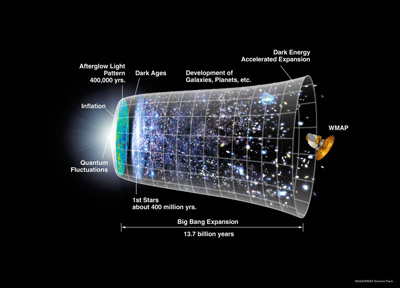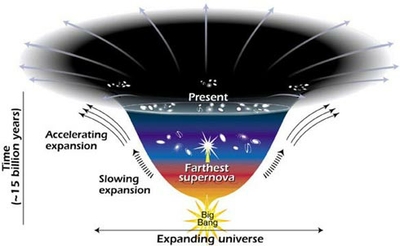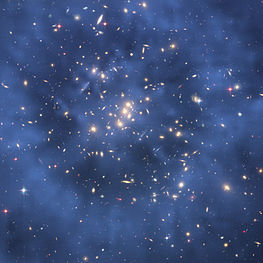Today one of the greatest questions coming up is what is dark matter. also what is dark energy. we don't know much about it still! I have tried to bring some light to this question.
1 Answer
what is dark matter ???
We know how much dark energy there is because we know how it affects the Universe's expansion. Other than that, it is a complete mystery. But it is an important mystery. It turns out that roughly 68% of the Universe is dark energy. Dark matter makes up about 27%. The rest - everything on Earth, everything ever observed with all of our instruments, all normal matter - adds up to less than 5% of the Universe. Come to think of it, maybe it shouldn't be called "normal" matter at all, since it is such a small fraction of the Universe.
- says NASA
Dark matter is invisible. Based on the effect of gravitational lensing, a ring of dark matter has been inferred in this image of a galaxy cluster (CL0024+17) and has been represented in blue.
Observational evidence
Much of the evidence comes from the motions of galaxies. Many of these appear to be fairly uniform, so by the virial theorem, the total kinetic energy should be half the galaxies' total gravitational binding energy. Observationally, the total kinetic energy is much greater. In particular, assuming the gravitational mass is due to only visible matter, stars far from the center of galaxies have much higher velocities than predicted by the virial theorem. Galactic rotation curves, which illustrate the velocity of rotation versus the distance from the galactic center, show the "excess" velocity. Dark matter is the most straightforward way of accounting for this discrepancy.
-says WIKIPEDIA
what is its composition???
Most scientists think that dark matter is composed of non-baryonic matter. The lead candidate, WIMPS (weakly interacting massive particles), have ten to a hundred times the mass of a proton, but their weak interactions with "normal" matter make them difficult to detect. Neutralinos, massive hypothetical particles heavier and slower than neutrinos, are the foremost candidate, though they have yet to be spotted. The smaller neutral axion and the uncharched photinos are also potential placeholders for dark matter.
- credit Nola Taylor Redd,Space.com
Dark matter versus dark energy
Although dark matter makes up most of the matter of the universe, it only makes up about a quarter of the composition. The universe is dominated by dark energy.
After the Big Bang, the universe began expanding outward. Scientists once thought that it would eventually run out of the energy, slowing down as gravity pulled the objects inside it together. But studies of distant supernovae revealed that the universe today is expanding faster than it was in the past, not slower, indicating that the expansion is accelerating. This would only be possible if the universe contained enough energy to overcome gravity — dark energy. - space.com
 ![
According to this timeline from NASA, the expansion of the universe is accelerating.
IMAGE COURTESY NASA]4
![
According to this timeline from NASA, the expansion of the universe is accelerating.
IMAGE COURTESY NASA]4
So, Will the Universe Recollapse Then?
Despite the fact that up to 90 percent of the mass of the universe may still be made up of dark matter, cosmologists don't think that it would be enough to have gravity halt the expansion and cause a recollapse. This thinking is due in part to observation of supernovae in 1997, which indicated that the expansion is still accelerating and not slowing down at all.
A longer lasting universe won't do much for us though as it is thought that in the very distant (like, 1030 years distant - 1,000,000,000,000,000,000,000,000,000,000 years!) the proton will decay, all the stars will run out of fuel and be engulfed by black holes, which in turn will radiate all their mass, (as described in the article on black holes), leaving the Universe a vast, cold, sterile and lifeless place.
However, some cosmologists do think that there will be no Big Crunch!
thanks a lot.


